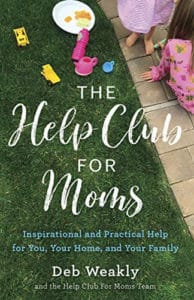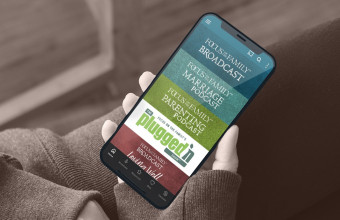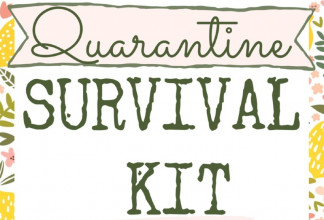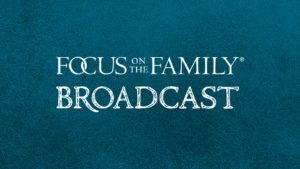Excerpt:
Mrs. Krystle Porter: And so, I can remember the day that I had my first little girl. And I felt like, “This is what I was hoping for. This was the day. This is it. I’m a mom now.” And I remember everybody leaving. You know, they – I have the baby. Everything’s great. I am good and holding her. And everybody left the room – you know, they’re going home. And – and I thought, “Do I even know what I’m doing? Am I just gonna mess her up?”
End of Excerpt
John Fuller: That’s Krystle Porter and she’s our guest today on Focus on the Family, along with some other ladies from “The Help Club for Moms.” Your host is Focus president and author, Jim Daly. And I’m John Fuller.
Jim Daly: John, I’ve talked about it before on the broadcast, but I had a really great mom. I only had her for nine years, but she poured so much into me. She was my world. Of course, she wasn’t perfect, but she had me feel loved and seen and heard. And now that I’ve watched my wife, Jean, raise our two boys, I know that returning the favor to moms and showing love and appreciation is one of the most important things we can do. And that’s why we dedicated yesterday and today’s broadcast to give moms some help and some hope. I really appreciated the honesty that Deb, Krystle, and Mari Jo brought to the table, and I’m looking forward to sharing the second half of this conversation with our listeners.
John: And if you missed the first part of this broadcast, be sure to find that on our website or wherever you get your podcasts. And as I said last time, Deb Weakly, Krystle Porter, and Mari Jo Mast are all in various stages of motherhood and marriage. And they’ve written a book called The Help Club for Moms: Inspirational and Practical Help for You, Your Home, and Your Family. We’ve got copies of that at focusonthefamily.com/broadcast. And, as you listen along, you’ll hear the reactions of our studio audience. This was recorded pre-pandemic, so we filled the room with other moms who are a part of the Help Club. And here now is how we started part two of this conversation on today’s episode of Focus on the Family.
Jim: Deb, Krystle, Mari Jo, welcome back to Focus on the Family.
Mrs. Deb Weakly, Mrs. Mari Jo Mast and Krystle: Thank you.
Jim: It’s good to have you here and all your friends.
Deb: Yes.
(LAUGHTER)
Jim: Hey, I want to start today off by encouraging moms in their relationships with their children. That’s really one of the main things that you do, right?
Krystle, Mari Jo, and Deb: Mm-hmm.
Jim: And, uh, Mari Jo, let me turn to you. You have a story about becoming a mom police officer.
Mari Jo: Oh.
(LAUGHTER)
Jim: And you’ve gotta love the title of that, right?
John: I think I know where that one’s going.
Jim: The mom police officer.
Deb: Oh, it’s so good.
Mari Jo: Yes.
Jim: Uh, what was going on? Why did you get the badge? (Laughter)
Mari Jo: Oh, my goodness. Well, kids were being kids. You know, all…
Jim: (Laughter) Have you noticed they start a lot of sentences like this?
(LAUGHTER)
Mari Jo: Oh, my. And I was already struggling so bad with being a bad mom. And I just had this feeling of – I felt like my kids were being bad all the time, like, day in and day out. And I was embarrassed to go places sometimes just because, um, they would act up. And I would correct them, but – and I would discipline them at home, but nothing ever seemed to work. And so, I had a friend of mine. Um, and she meant well. I mean, she did not have any idea what she was saying. And she told me to, like, keep track and discipline them every single time that they made a mistake. And so, I kind of kept a chart, and I kept track of every little thing that they did. And, um…
Jim: In your mind or in fact (laughter) or both?
Mari Jo: Tried doing both, you know?
Jim: Oh, my.
Mari Jo: Because I was really trying hard to, like…
Jim: Wow.
Mari Jo: …Make them good kids. Like, I was trying to form them into this…
Jim: So, you were…
Mari Jo: …Kind of robotic…
Jim: …The mom cop.
Mari Jo: I was the mom cop.
(LAUGHTER)
Jim: “Here’s your citation.” Rip. “Here you go.”
John: Wow.
Mari Jo: Exactly. Exactly.
Jim: “Show up in court. I’m also the judge.”
(LAUGHTER)
Mari Jo: And what happened was, I was just so angry all the time. I was so frustrated because I just couldn’t get them to do what I wanted them to do. And, um, it didn’t last very long. Thank goodness. It didn’t last very long. I…
Jim: What happened?
Mari Jo: Well, it didn’t work.
(LAUGHTER)
Mari Jo: It didn’t work. And – and so it made me cry out to the Lord, where I just was like, “God, I can’t make my kids listen.” So, yeah.
Jim: You know, let me – we always talk about the grocery store experience. You know, before you have kids, when you’re dating your fiancé, you’re going, “Oh, we’ll do such a better job parenting (laughter). Look at that woman on aisle 9.”
(LAUGHTER)
Jim: “She can’t handle her kids.” And then as time goes on, you become the woman in aisle 9.
Mari Jo: Yes.
Deb: 100%.
Jim: And the next generation is walking in the other aisle saying, “Look at that poor mom.” You know, it just is this vicious cycle. But the question is – yeah. What do you do? You just go to that grocery story scene. You had seven children.
Mari Jo: Yes.
Jim: So, you had a handful.
Mari Jo: Yes. And I didn’t take them all at once very often.
Jim: I’m assuming maybe just four came.
(LAUGHTER)
Jim: But, uh, you know, what – how do you say to the mom that struggling with that right now, being the former officer that you were? (Laughter)
Mari Jo: Relax.
Jim: Yeah, relax.
Krystle: Yes.
Jim: That’s good.
Krystle: Kids are gonna be kids. Love them where they are. And I think the more uptight we are as parents, our children feel that, and they respond to that, to that uptight feeling that we have. And it makes it way worse.
Jim: Can I ask you – when you were in that moment – and Jean has shared this with me. It’s a reflection on you.
Mari Jo: Mm-hmm.
Jim: And that – Jean and her tender mommy heart would say, “That was what was really irritating me.”
Mari Jo: Yeah.
Jim: “I mean, it didn’t speak highly of my mother skills.”
Mari Jo: Right. Yes, yes.
Jim: And that’s right, huh?
Mari Jo: Exactly. And I think that’s where the comparison comes in when those moments happen in the grocery store, uh, wherever you are, and your kid acts up, you know, and you’re, like, shocked at what they’re doing. You’re like, “Why are you acting like this?” And – and then you compare yourself with the mom who has the kids who – they’re doing everything right. You feel like it. You don’t, at least, see the times when they…
Jim: Right.
Mari Jo: …Their kids mess up.
Jim: It’s that moment, a snapshot.
Mari Jo: But it’s that – yeah. And then you start feeling bad about yourself.
Jim: Yeah.
Mari Jo: And so, you know, I think God sees you, is what I would say. God sees you. He knows. And He has an answer. A lot of times, our children respond because there’s something going on in their heart that, um, is – it’s troubling them. And so, start asking God for the root issues…
Jim: Oh, that’s good.
Mari Jo: …Rather than trying to fix them from the outside.
Jim: Fix the symptom.
Mari Jo: Yeah.
Deb: Yes.
John: And Mari Jo, in the book, um, I believe you use a passage in Romans and talk about the importance of modeling, so the Scripture – kind of rewriting the script, if you will, in your head and that translating into actions.
Mari Jo: Yes.
John: Do you remember that verse?
Mari Jo: Yes, it was – uh, “It’s the kindness of God that brings you to repentance.”
Jim: Romans 2:4.
Mari Jo: Romans 2:4, yes.
John: Did that do a more effective job as you tried to live that out…
Mari Jo: Oh, my goodness.
John: …For your kids than the book of shame you had going?
Mari Jo: Yes.
Jim: (Laughter).
Mari Jo: I realized that, when I give them what they don’t deserve, it actually makes more of an impact because they already know when they mess up.
Jim: Yeah.
Mari Jo: They don’t need us to always…
Jim: That’s a good point.
Mari Jo: …Be telling them. Um, they already have this innate knowing that, “I’m being bad.” And so, when you’re giving them what they don’t deserve, which is what Christ did for us, it really – it drives it home, so…
Jim: Yeah. Here’s a tough one. And, Deb, I’ll point this question to you. I think every mom wants to have that great close relationship with each of their children.
Deb: Mm-hmm.
Jim: And then there’s maybe one child that’s not connecting quite right.
Deb: (Laughter) Or acting up or…
Jim: (Laughter) Well…
Deb: You’re the mom…
Jim: But it’s that…
Deb: …That leaves the play group crying with the crying kid (laughter).
Jim: Yeah, but it’s that connection where you may be in a season where you’re struggling with that one child.
Deb: Yes.
Jim: What happened in your circumstances, and how did that manifest?
Deb: I was always the mom who would leave – the always – never-and-always thing that we brought up – I was always the one that would leave with a child that had been disobedient or was crying. And so, I would leave, and I would feel like the worst mom. Or she would – I always tease, and I say she would put her toe right on the line that we told her where not to cross.
(LAUGHTER)
Deb: And, uh, it was hard because she was so strong-willed. And, um – I think that sometimes – I think it’s good to remember that especially those strong-willed kids that are getting in trouble all the time – they could be those children, and you may be married to a husband or have a wife that, when they get angry or act up, it’s because they are mad at themselves for what they did. So, with my daughter, she would often act worse when she was messing up and doing things wrong because she was feeling bad, but she didn’t know how to fix it.
Jim: Right.
Deb: Like, I think children – and husbands are like that.
(LAUGHTER)
Deb: You know, sometimes…
Jim: Keep coming. Yeah, come on, yeah.
Deb: Sometimes…
(LAUGHTER)
Jim: Yep.
Deb: Sometimes our husbands could be angry. And they’re angry because they are angry at themselves for getting angry, or they’re angry at themselves for losing their temper. And I think that, as wives, and with our children and with our husbands, that the more that we can come alongside of them and say – like, with my daughter, we would start calling – Romans 4:17, “Where God gives life to the dead and calls those things that are not as though they yet were.” And it’s when God called Abram Abraham – before he had children, God called him the father of many nations. And when we call out the goodness in our children and anything that they’re doing right – or our husbands – when we’re calling out any good that they’re doing and catching them being good and saying, “You know what? I know that you don’t want to fight with your brother” – or you say, “You were so kind to your brother yesterday or right now” – or with your husband, “I know that you don’t mean to get upset, and I know your heart is to be patient. And, you know, I love you so much. And I just see so much growth in you,” and I just feel so much of our words – by bringing life with our words, we’re acting like God.
Jim: Yes.
Deb: We’re acting like God. And we’re calling those things into being that may not have been there yet.
Jim: You know, and it’s – I think it’s just the fleshly nature of all of us.
Deb: It is.
Jim: …That we tend – especially in close, intimate relationships, like your spouse, you can really lean into – and I think men do this because it’s our default nature – sarcasm and cutting down.
Deb: Yeah.
Jim: And it’s so destructive. I mean, I think that’s been one of my weakest points. Uh, you know, and I’m trying to do better to be more uplifting and positive and reinforce and just bite my tongue when I’m about to say something that might be quite funny…
(LAUGHTER)
Jim: …But at someone’s expense, you know? So, I’m trying to do better. I should be mature in my 50s by now, right?
(LAUGHTER)
Jim: But I’m working on that. Krystle, uh, you have an emphasis about having fun with your kids. You love…
Krystle: Yes.
Jim: …With your family and your kids.
Krystle: Yeah.
Jim: So, in fact, there’s a list of things you can do. We’ll post that at the website…
John: Great idea.
Jim: …If you’re willing…
Krystle: Yeah.
Jim: And that’s okay.
Krystle: We came up with a little list of…
Jim: So, what’s that list of fun? I need it now.
Krystle: I know. You know what?
(LAUGHTER)
Krystle: You know what I think it springs from – is, I like to have fun.
Jim: Yes.
Krystle: And motherhood can not feel fun…
Jim: Right.
Krystle: …Sometimes. And so, maybe that’s why it’s a little bit more of a priority to me because I’m like, “Man, we got to have some fun in our day, or I’m going to lose my mind.” And so…
(LAUGHTER)
Krystle: Um, but also the idea of having fun with my kids and on their level – like, if my daughter, for example, says, “Mom, will you come play Barbies with me?” – I mean, I would probably rather have a cheese grater to my forehead…
(LAUGHTER)
Krystle: …Than play with Barbies. And I just…
Jim: You’re not a Barbie fan, I take it.
Krystle: …I don’t love pretending. It’s just – that’s a part of motherhood that’s always been a struggle for me. And so, kind of from that, I’ve been like, “Okay. Well, what will I do?” Because, you know, instead of beating myself up – the, “Oh, I don’t get on the floor and play with my kids” – I don’t do that very often. I – but I do things that I like to do, and I bring them into it. And so, then everybody wins, hopefully.
(LAUGHTER)
Krystle: We’ll ask them later on in life.
John: So, what’s the example of that for us?
Jim: I’m not sure what to say about that.
Krystle: So, an example – I know, right? I know. I know that.
John: I appreciate your honesty about that.
Krystle: Yeah. It’s – and, you know, I don’t think I’m alone. I’ve talked to a few friends that feel the same way about pretending. But the – yeah. See – right here.
Jim: We’ve got some nodding heads in here. So…
Krystle: So…
Jim: So, what do you do? Yeah.
Krystle: What do I do? Okay. So, for – earlier this year – or last year, all my kids, all five, got whooping cough. So, we were all losing our minds – so, what I was talking about before. And, um, we had to figure out what we were going to do. So, you know, in the book, I talk about how, one night, we were just – I was just looking around. And it was just a sad story – looking around my house, you know?
(LAUGHTER)
Jim: Cabin fever.
Krystle: And – yeah, cabin fever. I had been awake what I felt like was 200 nights just because the cough flared up at night.
Jim: Yeah.
Krystle: And so, I was just awake, and I was a zombie mom. And I was super grouchy. And so, we – um, I’m like, “Guys, let’s go outside. Dad’s gonna grill something for dinner, and we’re gonna have a dance party outside, okay? And pick your song because you’re gonna be on display. We’re all going to clap for you. It’s gonna be great.” And all the kids are just like, “Yes. You know, this is it. We’ve been waiting to have some fun, you know?” And so, even in the midst – I think sometimes it’s hard because when you’re in the midst of the hardness of being a mom and when – especially when your kids get sick or – I don’t know – you’re having issues with one of them, fun is kind of at the bottom of the list because you’re just trying to survive. And you – you don’t want to do that.
Jim: Well, you don’t feel it.
Krystle: You don’t feel it, no.
Jim: So, you got to say yes, and then do it. Then you feel it.
Krystle: Yes. And love is a choice. If I want to love my kids, I need to make sure that I’m, you know, fun. Kids are fun.
Deb: They’re fun.
Krystle: That’s what they want to do.
Jim: (Laughter).
Krystle: So, I mean, yeah. So, we have – you know, in the book, it’s 25 simple ways have fun with your kids. But a couple of them are, like, have a backyard campout with s’mores; make homemade play dough. And these are, like, things that you don’t need to go – you don’t need to go to the, like, you know, the nearest jump place and pay all this money to have your kids have fun. You can have fun. Make milk and cookies. Have a milk and cookie night. Every Friday night, it’s milk and cookie night, whether they’re store-bought because that week is busy…
Jim: I’m in.
(LAUGHTER)
Krystle: I’m in, right? Or whether you’re making them all together – but just the simple things and that little, little bit of intentionality, I think, with our kids goes a really long way.
Jim: That’s good.
John: This is Focus on the Family and today we’re sharing a great conversation we had with Deb Weakly, Mari Jo Mast and Krystle Porter and other members of the Help Club. And, uh, we’ve enjoyed so much talking about their book The Help Club for Moms. Look for your copy at focusonthefamily.com/broadcast. Or when you call 800-A-FAMILY.
Jim: All right. We’ve had a lot of fun talking about, uh, being the mom to that little boy or girl. Now let’s talk about marriage…
(LAUGHTER)
Krystle: All right.
Deb: …In the midst of parenting.
Mari Jo: Yes.
Jim: That’s a tough one. Uh, every single mom is going to have a different experience, obviously. But you’re juggling so much. And then there’s dad…
Deb: There’s dad (laughter).
Jim: …Husband, um, who’s saying, “Hey, you know, uh, can I spend a little time with you?” – however that works out. And you’re saying, “I got nothing to give.” There’s a lot of tension in that. And, you know, here at Focus on the Family, we talk a lot about making sure your home is a marriage-centric home. That’s one of the best things you can do for your kids, is make sure they see you loving each other – right? – that mom and dad are engaged and have a good relationship. It’s the best thing you could do for them. Uh, but that takes commitment (laughter) and takes time, especially when you’re so tired. So, which one of you want to jump out there and volunteer some ideas on that tough point of being this tired mom with little ones grabbing at you all day. And then here’s dad.
Mari Jo: She knows.
Jim: Okay.
Mari Jo: And both of you guys know.
Deb: We all know.
(LAUGHTER)
Mari Jo: You all know, yeah. We all know. Yeah, it is – it is so hard to be intentional when you have a lot of children and you are just – I mean, I had a range of – from, like, 15 all the way down to, like, 4. And they’re all older now. But I just was being pulled from every direction. And then when dad would come home, husband would come home, it was easy for me to not see what he had been doing all day…
Jim: Oh, yeah.
Mari Jo: …Trying to provide for the family. And so, it was – and also easy for me just to be short with him and to just not, um, appreciate him when he would come home because all I could…
Jim: Where does that – for us dads, husbands, where does that come from? Help us better understand because we’ve all experienced that, too. And it’s not a guilt thing. But when you step through the door, and mom’s tired and all those kinds of things – but it’s the shortness. It’s like, you think to yourself as the husband, you’re going, “Wow. What happened? What did I do?”
John: “Not how I was planning it to happen,” yeah.
Jim: You know, sometimes it’s 2 feet in the house, sometimes 10 feet. But certainly, by about 50 feet, you get it.
Mari Jo: Yeah, yeah. I think it’s just, you feel so expended from doing the cooking to the laundry to, uh, meeting emotional needs, disciplining and all of the things that go with parenting. And, actually, I was kind of jealous that my husband didn’t have to do all that stuff. He could just kind of escape. I looked at it…
Jim: Right.
Mari Jo: …As an escape…
Jim: And that…
Mari Jo: …For him to go to work.
Jim: …Hurt you.
Mari Jo: Oh, yeah.
Jim: That made you feel bad, upset.
Mari Jo: It made me – it really – yeah. It made me feel upset. I felt like I was taking most of the responsibility of raising the children because he was gone so much, when in reality, he’s such a good husband. And I was just overlooking and not keeping in mind his part of what – you know, there has to be unity in your marriage. And so, you have to appreciate the differences, you know?
Jim: Well, in fact, you talk about winning as a team. Go ahead and describe that.
Mari Jo: Yes, just – well, I think winning is recognizing the difference of – of what a husband is called versus to – versus what you as a wife are called to and then as a mom and a dad, as well. And winning, I think, is just – it’s – it’s recognizing that you’re a team.
Jim: Yeah. Deb, uh, let me ask you – your husband – you were a little frustrated because you didn’t feel that he was providing kind of the spiritual leadership of the home. Okay, every wife just leaned in.
Deb: I know. Everybody’s gonna lean in because it’s…
Jim: “You go, Deb. You go, Deb.”
Deb: But I do want to say that what my husband did do right – and if there’s male listeners in the audience, he told me, whenever – ’cause he would work, and he would say, “You’re doing the important job.”
Jim: Oh, that’s so true.
Mari Jo: Yeah.
Deb: He would say that to me. And I think, if you’re a guy listening, and your wife – maybe she works or maybe she stays home, whatever it is – she’s still maybe the one getting up in the middle of night with a throwing-up baby or whatever – just to encourage her that you see her doing an important job.
Jim: It’s the eternal job.
Deb: It’s the eternal job.
Jim: It’s what counts.
Deb: Yeah.
Jim: It’s the spirit of your children.
Deb: So, my husband did tell me that. But I had a…
Jim: But back to this moment when…
Deb: Yeah, back to the moment…
Jim: …He was not angelic.
(LAUGHTER)
Deb: Oh, I know. I know. Um, so, uh, I had a really rough childhood…
Jim: Right.
Deb: …Which, as you can imagine, I had some rough teenage and early 20s. And I made some mistakes and things that I did not – desperately did not want my children repeating.
Jim: Sure. Fearful problems.
Deb: Fearful. I was so afraid of my kids doing what I did, and it really was a fear – it drove me.
Jim: Correct.
Deb: And I – I hate that I have that part of my story. But God worked it out. But my husband – so I was desperate, like Krystle, uh, not having a mom. And so, I thought, “Well, I’m gonna go to every moms’ conference.” I went to one here. It was amazing. It was – it was so good. And – but I went to all – I would fly to other states and go to mom’s conferences. At every conference – and the women hear this message so much in conferences and things that “Your husband needs to be reading the Bible to your kids. Your husband needs to, you know, be the one leading the spirit – the family spiritually” which is so true. But what if he doesn’t know how or…
Jim: …Or just isn’t doing it?
Deb: …Maybe he’s busy all day?
Jim: Yeah.
Deb: Maybe he’s busy all day and he doesn’t have time to think about it, so he comes homes and goes, “Oh, I was supposed to do something.” And so, we would get in big fights because I felt – and I know you guys probably feel this way – we’re like a woman, so we’re trying to learn how to be a submissive wife, right? We get that spoken over us a lot, which is important to be submissive, but we – we don’t know how to do it. Are we supposed to read the Bible? Are we allowed to read the Bible?
Jim: (Laughter).
Deb: You know, how do we come under his authority, right? But I’m so thankful for God’s grace in that he showed me how to be my husband’s helper.
Jim: Yeah.
Deb: And I think that as moms, this is what we could do – is for me in my home – everybody’s different – my husband was busy during the week and so what we would do is on Sunday morning we would – uh, I would make a big breakfast.
Jim: Oh, that’s nice.
Deb: And, uh, everybody would get up because it was pancakes and bacon. And then my husband would read, uh – his own voice – he would do the voices like when Saul would try to throw the spear at David, and he would always miss. So, Randy would talk – laugh about, “Oh, he always missed.” And it was fun. But I set the stage. I would, you know, get the kids out of bed. I…
Jim: So, it became an event.
Deb: …Did my part. It became an event.
Jim: No, that’s good. That’s good.
Deb: …Being his helper so…
Jim: You say that, uh, one of the most helpful things for moms to do is to find community. I mean, I’m sure some moms are going, “Are you kidding? I mean, I can’t get out of the house.” So, that’s probably part of the first question I’d like to ask you, is, “How do you do that when you’ve got so much going on?” Why are mom friendships so important though? And they should make time to find those mom connections and don’t use the excuse that I can’t find the time. What’s the benefit?
Krystle: I’m reminded of just the verse – I was just reading it this week. But it is, “While it’s still today, we need to be encouraging one another.” And I don’t know about you guys, but I need encouragement so bad, even…
Jim: And nobody can encourage a mom like another mom.
Krystle: Yes, I mean…
Jim: That’s true.
Krystle: …You commiserate. You, um, encourage each other. Sometimes another person is gonna see the good in your child that you’re not seeing. They’re gonna have something for you – a word for you that you needed. And, um, you know, if nothing else it’s lonely to be a mom.
Jim: Yeah.
Krystle: That’s – it’s a lonely job. And – and I can’t – you know, we were talking about marriage before. But, you know, a lot of times you can feel invisible – like the work that you do, nobody sees it. And your kids might see it a little bit…
Jim: Yeah.
Krystle: …But they don’t even know all the work that you do.
Jim: It’s true. And in that context, one of the, uh, occasional situations Jean and I would encounter is I could say, “You know, it’s okay. It’s not gonna be a long-lasting thing with Trent or Troy.” And she wouldn’t hear it.
Krystle: Yeah.
Jim: But if she called her girlfriend…
(LAUGHTER)
Jim: Right? I mean, I would – I had to settle down on that, and I had to stop saying, “Didn’t I say that?” I mean, you gotta learn to bite your tongue a little. But I think there is a special connection there. It’s like the ears open up a little wider when it’s mom-to-mom rather than husband-to-wife (laughter).
Krystle: Well, and the – the saying, “The days are long, but the years are short” and I had just wrote a thing down the other day. And I’m like, “The days are so long.” Like, they are so long, and you need that person that understands. I read this thing one time that said – you know, it was the husband thing. He came home from work and he said, “How was your day, honey?” And this mom described her day, and she said, “It was the best day, and it was the worst day.”
Jim: (Laughter).
Krystle: And it was, um, the roller coaster ride that you ride is so intense. And so, having that person that understands that makes…
Jim: It so true.
Krystle: It makes a huge difference.
Jim: How do you – how do you do it? How – what advice do you have for that mom who’s isolated right now? What can she do to get into community to find some other moms?
Mari Jo: Pray.
Deb: Join a Help Club. No, I’m just kidding.
(LAUGHTER)
Jim: Well, no. We…
John: …Pray and join the Help Club, yeah.
Deb: Yeah. So, Help Club For Moms is that. But we go deep with each other. We study the Word together. We have fun. We train our kids to know Jesus. And we’re going in churches and so join a Help Club or find a friend to pray with. Mari Jo and I pray together. Krystle and I – I have – Rae Ellen and I pray together. Krystle – all my – so many women, we pray together over the phone. And that’s a big thing in Help Club is we pray together. But you have to take the time and the energy and ask the Lord to bring you a friend. Ask the Lord to help you.
Mari Jo: A friend that’s like-minded.
Deb: Like-minded – that’s so important.
Mari Jo: Because…
Deb: We have to be careful.
Mari Jo: Right. You do have to be careful…
Deb: Yes.
Mari Jo: …Because sometimes the belief system that other people have may not be exactly what…
Deb: Yes.
Mari Jo: …What you are looking for…
Deb: It can make it worse.
Mari Jo: …In wanting to make you a more patient mother, you know.
Krystle: And – and, too, sometimes you have to be brave to ask someone to be your friend.
Deb: You have to be brave.
John: You have to get up and say, “I need help.”
Deb: Yes.
Mari Jo: Yeah. It takes humility.
Krystle: I – I – I can tell you I told somebody before, “Hey, will you be my friend?” Literally as an adult…
Jim: (Laughter).
Krystle: …As an adult mom…
Deb: Me too.
Krystle: …I have asked people specifically…
Jim: How did the person respond to that? (Laughter).
Krystle: They were like, “I would love to be your friend.”
Deb: “Yes.”
Jim: Oh, that’s good.
Deb: It’s actually a really nice (unintelligible).
Krystle: It is.
Deb: I did that, too. Well, a year ago, I asked this lady. She’s in leadership at this ministry, and I went, “Can I please be your friend?” And people love that. And they need a friend. They need a friend.
Jim: Deb, let me – let me end here. We’ve gotten through this second day, and this has been great material.
Deb: Thank you…
Jim: And I hope moms…
Deb: …For having us.
Jim: …Do everything that you’ve suggested they should do. And I think they’ll be in a better place if they do. But when your kids grew up and left home, you had that startling realization about your own identity. And I think this is a great last question. Describe that time in your life and – and how you turned, uh, your depression around…
Deb: It was.
Jim: …Because that’s what you felt.
Deb: I was very – because my – my daughter was getting married. Uh, my son was in college. I had really worked hard on my children, and I worked in ministry. And – and it was just I didn’t know where to go…
Jim: It sounds like your…
Deb: …And I felt lost.
Jim: …Worth and your value walking out the door.
Deb: It was walking out the door…
Jim: …With your kids.
Deb: …And I was going, “Come back.” You know, it’s the one job that you don’t want to retire from.
Jim: Yeah, “Let me keep being your mom.”
Deb: You know, “Can we keep doing this please?” And so, I – but I felt like the Lord really helped me. It was a very dark time. It was honestly the darkest time in my life was after being an empty nester, a new empty nester. I feel for those moms that, uh, have grown kids. I’ll pray with Jean when she gets older. Um, but, yeah, I’ll be…
Jim: We’re right about there.
Deb: …There.
Jim: I mean, we’re there – 19 and 17.
Deb: It’s very – it’s just, it feels – I just can’t explain it. But God is so good. I just can’t say that enough. And if you come to a help club, our help clubs are very, very – we’re like this. Just come be with us.
Jim: Hold hands.
Deb: None of us has it all together. Jesus is the only One that has it all together. And so, we – we don’t judge each other. We don’t gossip. We love one another.
Jim: (Laughter).
Deb: And it’s the most amazing thing I have ever seen in my life. And it’s Jesus is what it is.
Jim: Now that’s really good.
Krystle: And there’s an online group, and on that group…
Deb: Online group on Facebook. Yeah. We do pray.
Krystle: …We pray. We pray for everybody in those groups, so if you’re feeling lost and you…
Deb: There’s a prayer request thread you can join.
Krystle: …Just join us online, we just pray and pray and pray for our moms that join us.
Jim: Well, this is so good. Thank you for being with us.
Deb: Thank you so much.
Jim: And thank you for these wonderful ideas to help moms particularly lift their eyes to the Lord and then their families. Thank you.
Deb: Thank you.
Mari Jo: Thank you.
John: Well, we so enjoyed having Deb and Krystle and Mari Jo as well as the entire studio audience along with us earlier this year as we recorded before the pandemic began.
Jim: It’s true, John, and I mentioned this yesterday, but I want to reminder our listeners about our free counseling consultations that we offer here at Focus on the Family.
John: Mm-hmm.
Jim: One single mom called us during the height of the pandemic and said she was completely overwhelmed. She had to work long hours and her kid’s school was closed. And this mom was connected with one of our counselors who prayed with her and helped her brainstorm childcare options. And also gave her ideas for keeping her kids on track with their online school. The mom thanked the counselor profusely and said it helped so much.
John: Yeah, that counseling team is, uh – they have such great hearts. They’re so committed. And your problem isn’t too big or too small, so please, if you’re struggling, reach out. Our donors take care of the cost of, uh, these counselors being there for you. So, it’s never a cost to you for that initial call. Our number is 800, the letter A and the word FAMILY. Or you’ll find a counseling request form at focusonthefamily.com/broadcast.
Jim: And if you feel like you’re missing something in your day-to-day relationship with God and your kids, I highly recommend you get a copy of the book The Help Club for Moms.
John: And I really appreciate how practical this book is, Jim, it’s got that list of 25 Simple Ways to Have Fun with Your Kids that, uh, Krystle mentioned last time.
Jim: Yes, and if you’d be willing to become a monthly supporter of Focus – that’s the most helpful type of support you can give – I want to send you a copy of The Help Club for Moms as our way of saying thank you.
John: And, again, call 800, the letter A and the word FAMILY to donate. Or go to focusonthefamily.com/broadcast. On behalf of Jim Daly and the entire team here, thanks for joining us today for Focus on the Family. I’m John Fuller inviting you back as we once again help you and your family thrive in Christ.




















